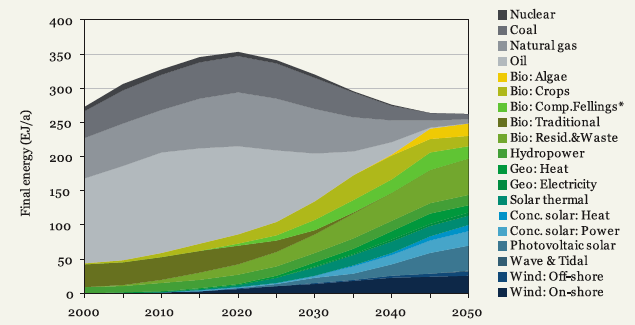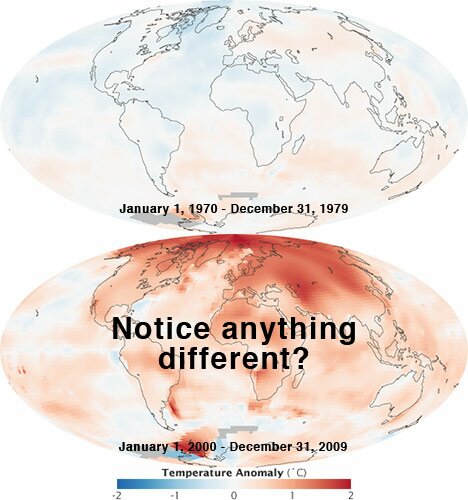100% Renewable Energy by 2050
Posted By: Amanda Gillen
Date: March 25th, 2011
Category: Climate Change, Social Responsibility
Can it really be done? Skeptical Science brings you “A Plan for 100% Renewable Energy by 2050.”

Posted By: Amanda Gillen
Date: March 25th, 2011
Category: Climate Change, Social Responsibility
Can it really be done? Skeptical Science brings you “A Plan for 100% Renewable Energy by 2050.”

Posted By: Amanda Gillen
Date: December 14th, 2010
Category: Climate Change
Tags: Climate Change, groSolar, Jeff Wolfe, solar energy

Posted By: Amanda Gillen
Date: September 27th, 2010
Category: Climate Change
Tags: 350.org, Climate Change, global work day, groSolar, grow solar, Jeff Wolfe
groSolar supports 350.org’s 10-10-10 Global Work Day to fight climate change. Here’s CEO Jeff Wolfe atop our corporate headquarters in White River Junction, VT showing support near the 100 kW solar electric array on our roof.

Posted By: Amanda Gillen
Date: August 24th, 2010
Category: Climate Change
Well, this is just depressing. The Global Footprint Network has calculated “Earth Overshoot Day”:
Every year, Global Footprint Network calculates nature’s supply in the form of biocapacity, the amount of resources the planet generates, and compares that to human demand: the amount it takes to produce all the living resources we consume and absorb our carbon dioxide emissions. Earth Overshoot Day, a concept devised by U.K.-based new economics foundation, marks the day when demand on ecological services begins to exceed the renewable supply.
This year, Earth Overshoot Day was Saturday, August 21. This means that we are now living off of credit from the earth and building upon our past debts. The Global Footprint Network expects that this year we will use 150% of the resources the earth can generate this year.
Not only is this unsustainable but we are setting ourselves up for a disaster. Why don’t we do something about it?
Posted By: Amanda Gillen
Date: August 6th, 2010
Category: Climate Change
For many years, Russia has denied that climate change existed going so far as to blame the climate change idea on an international media conspiracy. However, the recent heat wave and wildfires have caused something of a change of heart. As Russian President Dmitri Medvedev stated on July 30th,
“What’s happening with the planet’s climate right now needs to be a wake-up call to all of us, meaning all heads of state, all heads of social orgnaizations, in order to take a more energetic approach to countering the global changes to the climate.”
Read the full article from Time – it’s worth the few minutes.
Posted By: Jeff Wolfe
Date: July 19th, 2010
Category: Climate Change
There is no denying it – what happened last December in Copenhagen was disappointing. But although only a weak, non-binding agreement emerged from COP 15, the struggle for climate legislation is by no means over. In fact, as we watch more than 200,000 gallons of oil spill each day into the Gulf of Mexico, we have more proof than ever that we must continue the struggle.
Preparations and negotiations are well underway for COP16, where the Gulf spill must be used as a worldwide example to show how action on climate protection through legislation and treaty can create a pathway to the benefits of reduced fossil fuel use. We must use the spill as momentum to agree to an outline this year of what will become a binding international treaty to be concluded and signed at COP17 in 2011, in South Africa.
Since more than 40,000 people from 194 countries and 832 NGOs attended COP15 in Copenhagen, and similar numbers are expected for COP16 in Cancún, it is clear that climate legislation is a worldwide priority.
Free Market Solutions Aren’t Enough
Why is there such a push for government legislation instead of privately funded action in the free market? We have seen the incredibly strong efforts of some businesses that are working to combat climate change through renewable energy, recycling technologies, energy efficient appliances and more. Why is this not enough?
One problem with the “free market” system in the U.S. is that it only provides incentives for individual companies to maximize profits. Relying on these often legally-defined short-term profits restricts companies from taking action against many areas of climate change unless government regulation requires it. There are many important initiatives that cannot be driven through profit motive, since the profit (either to businesses or consumers) is too far in the future.
The nature of the “free market” is such that innovation in business will only provide solutions for which there are direct financial incentives. These incentives are binding governmental legislation. With legislation, individual businesses could provide better safety for drilling and transport, and stronger prevention measures for pipeline spills. With the right incentives, they could provide the necessary push to drastically reduce our use of oil, which is the only real way to greatly reduce the likelihood of future spills.
Though the Gulf spill is attracting lots of media attention at the moment, it is not the only oil-related disaster, or even the largest. Since 1969, spills in Nigeria have dumped as much oil every single year as what was spilled in the 1989 Exxon Valdez spill, causing extreme environmental and social upheaval. Using climate legislation as a vehicle to assist moving the world off oil is crucial for Nigeria and other underdeveloped countries whose individuals will suffer the most from climate change and environmental issues, and yet do the least to cause them and have the fewest resources to pay for them.
We need a legally binding treaty that will force oil companies to have working spill clean-up and prevention technologies and other companies to look for ways to drastically reduce our dependence on oil. And we must start here in America, where public support is high as we watch the damages caused by the Gulf spill.
The Gulf spill provides a clear example of privatized profit and socialized risk: there is much more private money to be made in drilling for oil than in preventing or even cleaning up spills, meaning that no truly effective technology has been developed to stop and clean up the spill. (While BP may blame the failure of every single planned solution and failsafe on accidents, we know that the energy and money that went into spill prevention and clean up technologies was significantly less than what went into new drilling technologies.)
The spill is disastrous to the local ecology and economy, including the enormous fishing and tourism industries along the coast, which have completely shut down, putting thousands of people out of work. But while we work to help the suffering environment and industry, we must also use the force of public opinion as a push towards legislation. Climate legislation would put a price on carbon, helping America and the world lessen its reliance on oil and reducing the number of future oil-related disasters. It might also provide incentive for the private sector to create better clean-up and prevention technologies in case those disasters do occur.
Recent polls show American public opinion strongly in favor of decreasing our reliance on oil and fighting climate change. Yet, without a financial signal that something must be done, changing the practices of most American businesses is very difficult. While the American public does not necessarily follow their pocketbook, price signals help do shift business actions. Climate legislation, with a price on carbon, will provide the signal, the financial incentive, and the culture-driving motivation.
We cannot see the end of our reliance on oil as an impossible feat. We must see it as possible and necessary, but understand that we need government regulation to assist the free markets by providing proper market signals. It is not too late to end our dependence on oil and reverse climate change, but we must act now.
America must be a leader of the movement with national climate legislation that will pave the way for governments of the world to follow. We must spread the word about the importance of this legislation and the long-term benefits for our country and planet. We demand that our Senators and Congressmen work to place America in a position of positive leadership for the COP 16 conference, prepared to lead the rest of the world towards a binding international climate treaty.
Posted By: Amanda Gillen
Date: February 18th, 2010
Category: Climate Change
 Global Warming.
Global Warming.
Climate Change.
Global Climate Change.
Atmospheric Physics.
Atmosphere Cancer.
Greenhouse Gas Warming.
Climate Crisis.
Global Weirding????
In a NY Times Op-Ed by Thomas Friedman (Hot, Flat, and Crowded) posted yesterday, Friedman suggested a new term to define what’s happening to our earth and the climate: Global Weirding. As Friedman says:
I prefer the term “global weirding,” because that is what actually happens as global temperatures rise and the climate changes. The weather gets weird. The hots are expected to get hotter, the wets wetter, the dries drier and the most violent storms more numerous.
The term ‘global warming’ has gotten a pretty bad PR wrap. People tend to think that if it’s cold outside then global warming doesn’t exist. ‘Climate change’ better describes what’s actually happening but lacks the ‘take action now’ fear from the word. So is it ‘global weirding’? Post your thoughts using the comments link above.
Posted By: Amanda Gillen
Date: January 5th, 2010
Category: Climate Change, Social Responsibility
Tags: 350 ppm, 350.org, Climate Change, groSolar, Jeff Wolfe
Our friends over at 350.org have done a great job with the grassroots effort to get people to take action on climate change to bring us back down to the magical number of 350 parts per million of carbon in our atmosphere. They have created some cool videos to recap the year. We really liked one in particular but you can see all of the videos here.
Posted By: Amanda Gillen
If the climate is keeping you up at night, we totally understand. We have had one too many nightmares about carbon monsters. If it’s not maybe you should check out the article, “Top Ten Reasons the Climate Should Keep You Up at Night“. Some of the worries are not what you would expect.
Posted By: Amanda Gillen
Date: December 14th, 2009
Category: Climate Change
Tags: 350.org, bill mckibben, Climate Change, cop15, copenhagen, groSolar, Jeff Wolfe
350.org has been rallying people around the world to take action on climage change. Most recently they organized a weekend of action December 11-13. Bill McKibben, 350.org founder and also a groSolar customer, sent out a rather inspiring email late yesterday about the success of this event all over the world. We wanted to re-publish that email here:
Dear Friends,
Thanks beyond thanks.
It’s been a remarkable day for those of us here in Copenhagen, but mostly not because of anything happening at the climate conference.
Instead it’s because of what you all did out in the rest of the world over the last 24 hours. We don’t have a full count of vigils around the world, but in something like 3,000 cities and towns across the planet your vigils sent the most powerful of messages to the leaders here: stop playing games, and start protecting the planet.
Here in Copenhagen, there were more than 100,000 people marching in the streets–99% of them peaceful and dignified–to call for climate solutions bold enough to meet the scale of the crisis. As the sun set on this city, thousands lit candles to stand in solidarity with those on the front lines of climate change–a moving and unprecedented moment in this movement.
We’ve already started to get your photos in front of world leaders and the global media assembled here. If you haven’t yet submitted your photos, videos, and stories, please do so just as soon as you can by visiting this link:
http://www.350.org/vigil-report
We’re projecting the images on walls and screens all around Copenhagen, and starting Monday we’ll be putting them to good use as lobbying tools for UN delegates from Argentina to Zimbabwe.
A wide network of allies and individuals helped pull this amazing feat off, and thanks to them–and all of you–our collective call to action is unavoidable. More importantly, our message was clear: the world can’t afford just any climate deal–we need a real deal that is fair enough to protect those bearing the brunt of climate impacts, is legally binding and enforceable, and is ambitious enough to get the world back on a path to 350.
While there’s no guarantee that world leaders will pay attention to this call with the level of ambition that’s required, we can guarantee that you’ve given this movement another boost at a crucial moment.
We’ll be in touch in the coming days, but for now know that everyone here sends their deep thanks and love.
Onwards,
Bill McKibben for the 350 Team